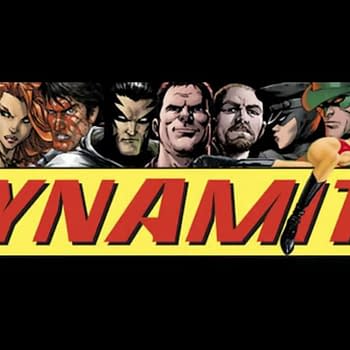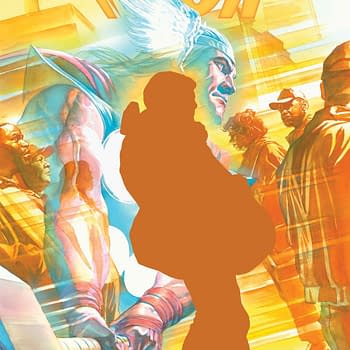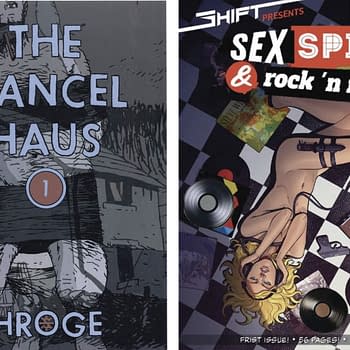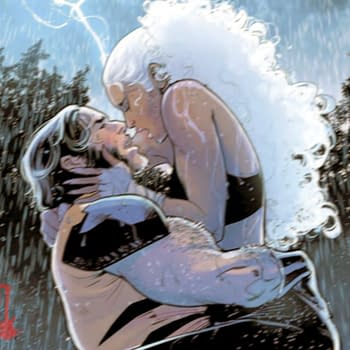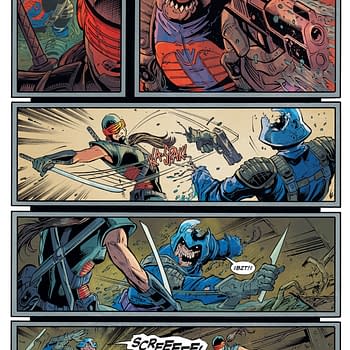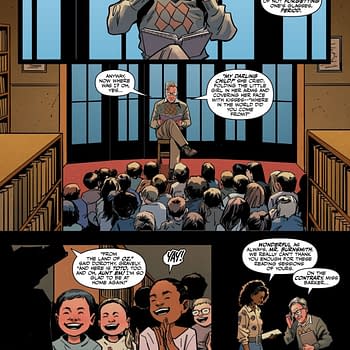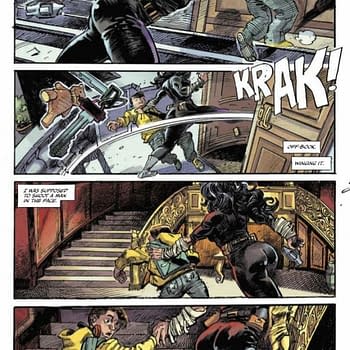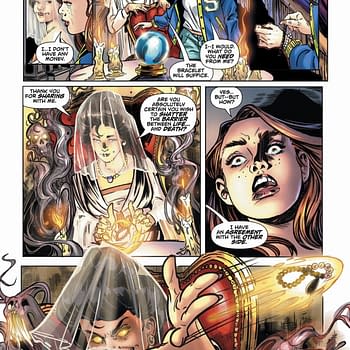Posted in: Comics | Tagged: Comics, harassment, HRL
Mark Waid On Death Threats, Harassment, And Current Discourse In Comic Books
Last week, there was considerable discussion regarding plans that comic book writer Mark Waid had for Baltimore Comic-Con, and whether or not certain people would be there.

Harassment in this industry towards young creators of gender and of color, LGBTQ+ creators, just peaked. Something awful has happened and we need to talk.
I just got back from Baltimore Comic Con, which was its usual one-of-the-best-conventions-in-the-nation. Marc Nathan and his crew are courteous, attentive, and most importantly, terrifically sensitive to the safety concerns of some of the creators and fans who feel threatened by the current climate, alleviating their worries. Marc and his team are knights.
Over the past couple of weeks, a disappointingly large number of younger creators have been reaching out to me about harassment from angry fringe "fans." With that in mind, the best and most worthwhile moments of the convention came from walking the floor, talking and listening, helping raise awareness of how bad harassment has become—awareness both among fans and among my generation of pros. Too many of the latter were still of the "Ahhh, ignore haters, they'll go away" school until I reminded them of the demented, armed fan at Phoenix Comic Con last May who was arrested just before he could assault a guest of the show. Until I could share with them confidentially some of the most serious rape threats and death threats. The folks I talked to, many of them with big megaphones, some of them storeowners, a couple of them well-intended YouTube commenters eager to distance themselves from the personal-attack ones, are all ready to redouble their support to those younger pros who feel unwelcome or targeted. Regardless of gender or race or background, we worked together on some positive actions we can take in the days and weeks to come. That's no silver bullet, but I've been assured that it's a step forward.
Conversely and with transparency, let's talk about my misstep. By unartfully making my original post about industry harassment sound as if all of it came only from one or two YouTube videos and not also from the repeated misogynist/anti-LGBTQ comments—made in private as well as in public—I got thrown by a brilliant bit of opposition judo: I allowed the conversation to be framed as "Comics creators can't take criticism!" or "Comics creators punch down on innocent fans!" I fell into that trap like a total tyro, I didn't do us any favors, and anyone who recognizes that can glare at me; I deserve it.
So, with more clarity: the actual problem, the one that so many younger or career-vulnerable creators keep speaking to me about, isn't YouTube videos that complain about a black girl in Iron Man armor or how Marvel did a story that temporarily turned Captain America into a Nazi. They're not the ones that scream in all-caps titles that I'm a sick SJW who's destroying comics with my liberal agenda. Fine. You buy the comics, you have a right to an opinion, obviously. Broadcast your thoughts. It's a free country. Have at. In fact, come at me if you're offended by progressivism. I'm proud to be a progressive writer, and as a freelancer I can speak freely for myself without fear of being censured or accused of representing a specific publisher.
The actual problem is that there are a large number of younger creators/professionals/staffers in this industry–a larger number than you could possibly imagine–who do not have that same privilege. They are being harassed repeatedly, and it's getting worse. As I say, I've been talking with many of them over the last few weeks. These are not histrionic people. These are not overly dramatic people. They are reasonable adults, some of whom cannot speak out because of their employers. And yet they are legitimately frightened by harassers who threaten to come and find them at conventions, at stores, *at their homes.* One was told she should be burned to death. Another was told that she should be put down like a dog. And those are examples of some of the less hateful attacks. I have screencaps of all of this material, I'm looking at them right now, and they're being dealt with by authorities, but that's where we're at. This is becoming commonplace, and I have reached the end of my patience.
Not long ago, one of my friends had something terrible happen to them because of all this. At their request, I can't talk about it right now–it's been a bit, but it was vile and the wound is still fresh. You may choose not to believe me, but I have always been truthful and transparent and straightforward with every one of you every moment of every day over the last 35+ years, and you know that. I have trusted you with my honesty and my thoughts, and now I need you to trust me when I say that some of these harassers have gone too far.
Criticism of the work itself is fine, but no reasonable person would fail to draw the line at direct personal threats and attacks on gender and race and orientation. All of you would hold that line, I know it. I believe in the people who have believed in me. So I'm asking for your help. Not to mob up, not to attack, not to confront–that does no good. These harassers feed on attention and they need to be starved of attention. They need to be drowned out. I'm asking for your help to change the signal-to-noise ratio. I'm asking for your help, on the behalf of the people who need us, to do two things, two simple things:
One: show your support. Share this piece far and wide. Comment all day long, wherever you can, to show those being bullied that we have their backs. And do it tomorrow, and the day after, and keep doing it. It makes a difference to the people who need us. If you reject bigotry, misogyny, and racism, remind others that comics is an inclusive medium made stronger by the voices it amplifies.
Two: Please–pro or fan–start championing positivity in comics, not hate. Established pros, myself included, have to really start tamping down the instinct to push back on social media even when the attacks get brutally personal and vicious. We have to rise above. We have to do our part to change that signal-to-noise ratio. Fans, we know we can count on you to spread a positive message; we are a medium of heroes, and there is nothing heroic about causing someone to suffer or standing by and letting it happen.
Champion positivity in comics, not hate. Talk about what you love. Try to look beyond that one title you think we've screwed up or that one artist whose work repels you. Think about what's happening to real people. Think about how that same hate could so easily turn on a friend of yours, or on you. There are hundreds and hundreds of comics published every month, and if your favorite one hits a rough patch, I'm genuinely sorry, I really am, but you know it'll eventually come around, so take the opportunity to expose yourself to other books, other series you might like. Hell, if nothing else, go read SAGA. No one doesn't like SAGA. Just tell each other about the wonders you find.
Maybe you think everything I've said here is overblown. Partly because of various investigations in play, I don't have a whole lot to show you at this time. I can't make you believe me. All I can do is once more remind you that I have always been open and honest with you, and I will never lie to you. Harassment to the point where professionals are pulling out of conventions or shying away from anywhere where fans tend to congregate is utterly unacceptable, and—frustratingly—there will always be some fans who don't take that concern seriously. We live in a cynical time. Empathy's in short supply. But even if you're still skeptical, it doesn't matter, not if you're a good people. Consider. Just as no one has the right to tell us what we do or don't have a right to be angry or frustrated about, no one should be able to tell frightened people that they don't have a right to be afraid. If you're grieving, if you're happy, we can respect your grief or your joy even if we don't share it, because we have basic human empathy. By that same measure, we can never belittle the feelings and fears of others just because we don't share them. At best, that's cold. At worst, it just creates more rage and thus makes everything worse for everyone.
I'm surrounded by a lot of good, concerned people as we work on this, most of whom are smarter and more aware than I am. Together, we're going to do what we can to help tamp down the anger and hate that's hurting us all. If this is something that matters to you, you are more than welcome be part of that conversation. If you just need to speak privately, we will listen. Either way, your voice is valued, and we will hear you.
Thank you.
As for a certain conversation referred to in that original post, Waid writes:






